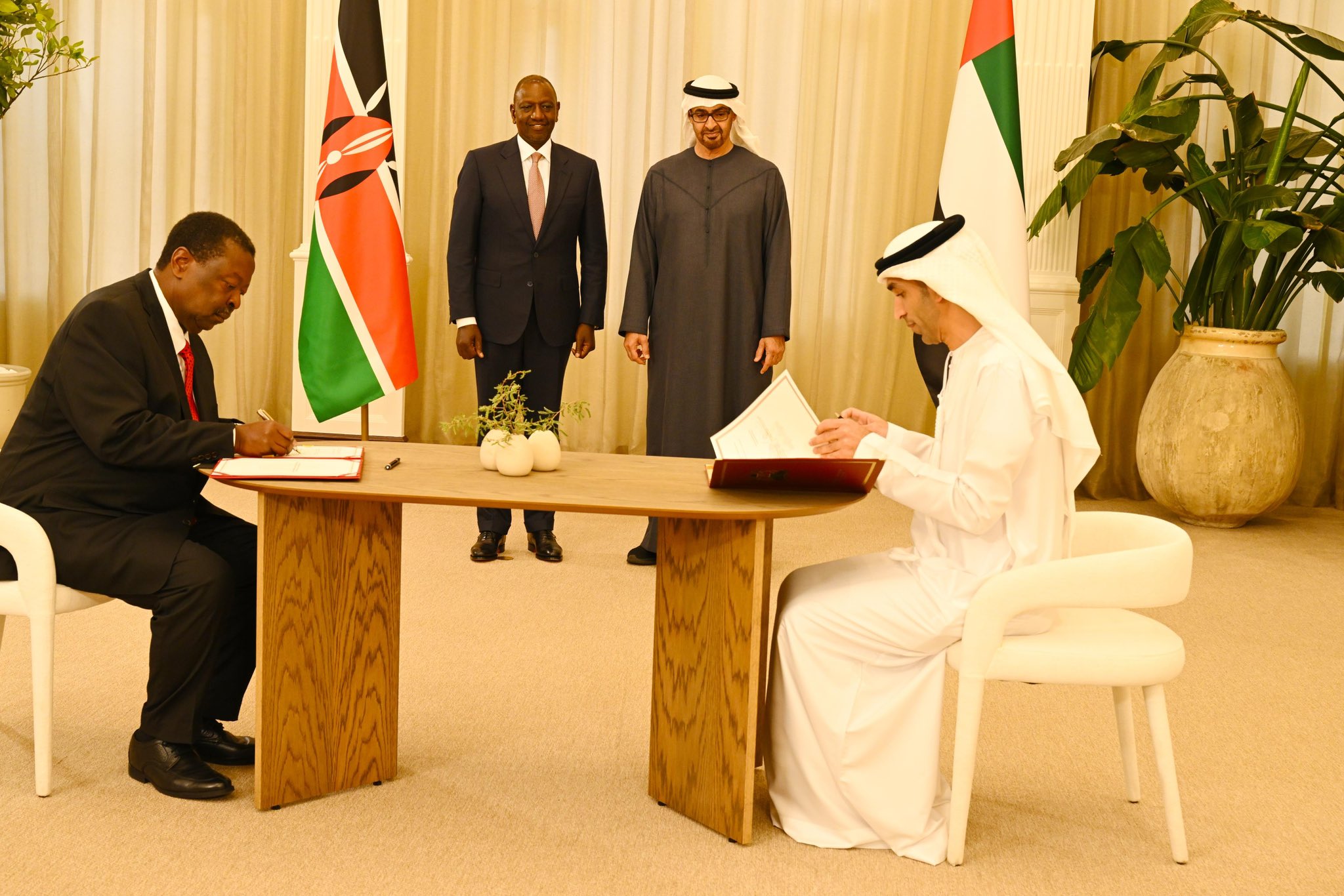 President William Ruto and UAE’s President Sheikh Mohamed
bin Zayed Al Nahyan preside over the signing of the Kenya-UAE Comprehensive
Economic Partnership Agreement (CEPA), January 14, 2025. /PCS
President William Ruto and UAE’s President Sheikh Mohamed
bin Zayed Al Nahyan preside over the signing of the Kenya-UAE Comprehensive
Economic Partnership Agreement (CEPA), January 14, 2025. /PCSKenya and the UAE have signed the Comprehensive Economic Partnership Agreement (CEPA), a historic deal aimed at easing market access for Kenyan products into the Gulf state.
The CEPA is the first agreement of its kind signed by the UAE with a mainland African country, representing a transformative step in enhancing trade, investment, and economic cooperation between the two countries.
President William Ruto and His Highness Sheikh Mohamed bin Zayed Al Nahyan, President of the United Arab Emirates, witnessed the signing of the deal.
Prime Cabinet Secretary and Diaspora and Foreign Affairs CS Musalia Mudavadi who is in UAE with the President signed the deal on Kenya's behalf.
It builds on Kenya's broader trade strategy, which includes key agreements such as the Kenya-EU Economic Partnership Agreement, the Kenya-UK Economic Partnership Agreement, the African Continental Free Trade Area (AfCFTA), and the African Growth and Opportunity Act (AGOA) with the United States.
“Today, Kenya has become Africa's gateway to the world, with duty-free, quota-free access to global markets representing nearly half of the world's GDP,” the presidency said in a statement dispatched by State House Spokesperson Hussein Mohamed Tuesday evening.
The Kenya-UAE CEPA agreement is expected to unlock new opportunities, enhance bilateral relations and contribute to the economic transformation of both nations.
Trade between Kenya and the UAE has more than doubled over the past decade with total trade between the two countries reaching Sh445 billion in 2023.
The UAE ranks as Kenya's sixth-largest export destination and second-largest source of imports, accounting for 16 per cent of Kenya's total imports.
Kenya exported Sh9.9 billion worth of agricultural products such as meat and meat products to the UAE in 2023, representing more than half of the country's total meat exports (Sh18.3 billion).
“Other notable exports include fruits-primarily pineapples, avocados, and mangoes—which account for Sh5.2 billion,” the statement said.
“Additionally, vegetables and flowers, which support millions of livelihoods across the country, generated a further Sh5.6 billion. In return, the UAE supplies Kenya with critical goods, including petroleum, machinery, chemicals, and other essential products.”
The CEPA agreement now serves to strengthen Kenya's position as a gateway to East and Southern Africa and reaffirms the UAE's role as a global logistics and financial hub connecting the Middle East, Asia, and beyond.
State House said the agreement will open job opportunities for Kenyans in line with the Bottom-Up Economic Transformation Agenda (BETA) by unlocking new markets for priority value chains.
“The CEPA goes beyond trade in goods…it opens new opportunities for Kenyan service providers in sectors such as education, transport, communications, construction, and engineering to access the UAE market.”
The statement added that the CEPA will also provide the UAE with investment opportunities in several sectors of the Kenyan economy, including energy, water, agriculture, health, ports, airports, logistics, human resource development, and ICT.
It adds that the deal also aims to deepen trade ties by eliminating barriers to trade, simplifying customs procedures, and promoting industrialisation and regional value chains.
The partnership, it says, will also attract foreign direct investment, and promote technology transfer to support livelihoods across the country.







![[PHOTOS] Uhuru visits Raila's grave in Bondo](/_next/image?url=https%3A%2F%2Fcdn.radioafrica.digital%2Fimage%2F2025%2F10%2F0a7bb837-9eaa-4053-be84-0ba48cc9964b.jpg&w=3840&q=100)




